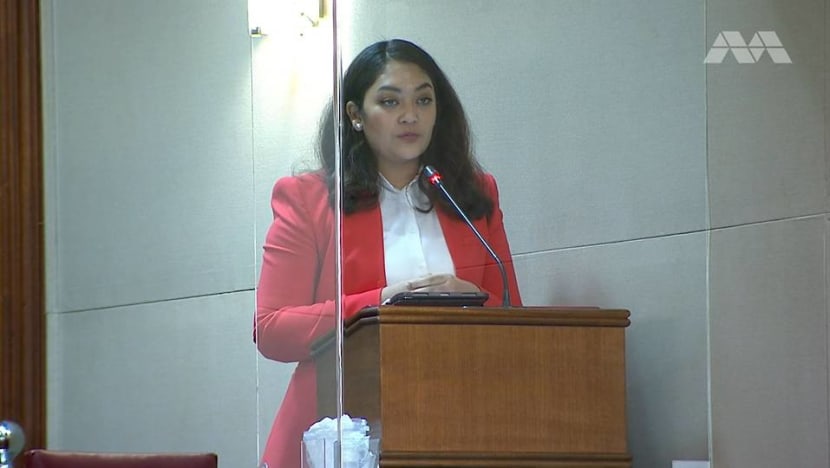Sexuality education for pre-schoolers among proposals by WP's Raeesah Khan to address abuse, harassment

Workers’ Party Member of Parliament for Sengkang GRC Raeesah Khan speaking in Parliament on Jul 6, 2021.
SINGAPORE: Mandatory sexuality education for younger children, a greater focus on teaching students about consent and having more time for such classes were among the suggestions raised by Workers’ Party Member of Parliament Raeesah Khan on Tuesday (Jul 6).
Speaking on an adjournment motion titled sexuality education in schools as a first line of defence against sexual violence, Ms Khan said: “While the Government has introduced stiffer penalties for sexual offenders, criminal deterrence is not a silver bullet for this issue.
“We must get to the root of the problem by building a strong culture of consent in our society. Without a strong consent culture, the criminal justice system alone cannot protect us, women, men and children from sexual harassment and violence.”
Law and Home Affairs Minister K Shanmugam said in January that from 2017 to 2019, there were 6,988 reports of sexual assault, including rape, sexual assault by penetration, outrage of modesty, as well as sexual offences involving children and vulnerable victims.
Of these cases, 2,798 victims were below 16 years old, 1,000 victims were between 16 and 20 years old, and 3,685 victims were aged 21 years and older, he said at the time.
STANDARDISED SEXUALITY EDUCATION FOR PRESCHOOLS
The number of underaged sexual assault victims is “likely to be much higher in reality” as many children may not be aware that they are victims and what they can do about it, said Ms Khan on Tuesday.
Noting that most sexual assault cases involving minors are committed by someone they trust, and only a small fraction seeks help, she said that mandatory sexuality education should be extended to young children.
A standardised sexuality education curriculum for all pre-school operators should be created, said the MP for Sengkang GRC.
“While our frontline caregivers must be more proactive in weeding out potential abuse, our children must be taught to recognise the wrongs being done to them,” she said.
Children should be taught body safety, when a touch is good or bad, what secrets should be shared with a trusted adult, and how they can get help, she added.
“Some might feel uncomfortable with introducing the concept of sex to pre-schoolers. As a mother of young children. I share their concerns about making sure that our children are not exposed to sexualised content.
“But sexuality education isn't just about sex. It's about teaching the concepts of normal relationships, boundaries, and respect for one another's feelings and bodies. These concepts can be taught in age appropriate ways,” said Ms Khan.
The sexuality education curriculum in schools starts at Primary 5 with the Growing Years programme, she noted.
Citing New Zealand as an example, Ms Khan said personal safety programmes there start sexuality education for children at the age of five.
“It's clear that hundreds of minors are hurt by sexual abuse each year. But the trauma of sexual violence finds many young victims far too early," she said.
“If we wait too long to teach our young children about consent, respect, and what to do if they ever face sexual assault, we are failing them as the adults they trust."
COMMENTARY: Why we need to teach pre-schoolers protective skills to stop child sexual abuse
In response to Ms Khan’s motion, Minister of State for Education Sun Xueling noted that a new character and citizenship education curriculum was launched this year.
Since the rollout of the sexuality education curriculum in 2014, the Ministry of Education (MOE) has been updating its content “to ensure that they remain relevant towards sexuality matters”, said Ms Sun.
“We considered emerging trends, local and international research, input from specialists in relevant fields and our local context, and also importantly, feedback from our youths on their concerns and how they want to be meaningfully engaged,” she added.
“These may sound new to those of us who did not go through this new curriculum nor experienced these new teaching delivery methods, but we recognise that there are new challenges that our youths are facing and we are committed to partner them in their adulting journey.”
Students learn about personal safety and protection from abuse from Primary 1, said the Minister of State, including what is a good touch and what is a bad touch.
In a Primary 5 lesson on sexual abuse, students walk through different scenarios to figure out if the situation is a case of sexual abuse.
They are taught to recognise sexual abuse and harassment through “carefully designed and developmentally appropriate” character and citizenship education lessons.
“They learn skills to protect themselves both in the physical and online space, and know the laws that protect them,” said Ms Sun.
“Also, we hope that by sharing with our students about different ways to seek help, it will encourage them to approach a trusted adult when required.”
WATCH: Secondary students to learn to guard against online predators in 'sexuality education' revamp
CALL FOR CURRICULUM TO FOCUS ON CONSENT
The sexuality education curriculum also needs to focus on consent, said Ms Khan.
She noted a 2020 survey conducted by AWARE and Ngee Ann Polytechnic that showed that more than half of the students surveyed were not taught about consent in school.
“It's not enough to simply teach that sex without consent is wrong. Consent is complex, and our students must know why it's important, and how to navigate it respectfully," said Ms Khan.
In the same survey, youths expressed trouble identifying consent in situations involving alcohol abuse and conditional consent, she noted.
“Rape myths, like how women who drink deserve it, or silence means consent, worsen this problem. Effective sexuality education must tackle these problems head on.”
Neither the current Growing Years sexuality education curriculum nor the eTeens programme developed by the Health Promotion Board “gets to the root of the problem”, she said.
“Our students need to be taught why consent is key, and how people cannot fully give consent in certain scenarios. It's commendable that some tertiary institutions now teach consent explicitly, but this must start earlier on in life," she added.
READ: MOE to work with schools to standardise modules on gender education and respect
MORE LESSON TIME FOR SEXUALITY EDUCATION
Sexuality education needs to be “more sustained” and “openly taught”, said Ms Khan. Students currently get 25 hours of class time for these lessons, equivalent to one week of school out of the 12 years spent in primary school to pre-university.
Students also need dedicated channels and access to educators who support students through relationships, emotions and abuse, she added.
“These spaces should be non-judgmental and confidential, so that our children and youth are willing to talk about their struggles," she said.
Some students find the current sexuality education curriculum “unrelatable”, said Ms Khan, and they want teachers to facilitate questions and conversations about sex in a “non-judgmental space”.
“They need regular open discussions in which they can ask questions, explore issues, not simply in a passive environment that only happens once or twice a year,” she added, noting that some may think parents should be responsible for their children’s sexuality education.
“The reality is that parents are uncomfortable talking about sex, much less teaching important concepts relating to it to their children,” she said, adding that some parents think talking to their children about sex may drive them to become sexually active.
Children may also feel uncomfortable learning about sex from their parents, or unable to address such topics due to “abusive dynamics” at home, said Ms Khan.
“Sexuality education is complex and leaving it up to parents to deliver accurate and up-to-date information about STIs, tech-enabled offences, and the nuances of consent might be too much to ask.”
WATCH: Parents, experts welcome new sexuality education curriculum, but with caution
The autonomous universities are implementing compulsory education modules on respect and appropriate behaviour, where students learn about the key elements of respect and appropriate behaviour, said Ms Sun.
For example, in the National University of Singapore module, students learn that consent must be actively communicated and given freely and voluntarily, she noted. These learning points are reinforced through compulsory workshops and peer discussions for those staying in hostels.
Students also learn what constitutes sexual misconduct and harassment, and are informed of the various reporting channels and support networks, said Ms Sun.
THE ROLE OF TEACHERS
In sexuality education, teachers are “especially important”, and all educators, especially early childhood educators, need to be more proactive and sensitive while addressing sexual abuse and assault, said Ms Khan in her speech.
“This includes being able to spot when students may have faced sexual assault, ensure their safety, handle reports sensitively and confidentially, and support students with empathy.”
They must also be trained in facilitating scenarios and discussion-based learning for sexuality education to be effective, she added.
Adding that she was “glad to know” that the Education Ministry currently requires sexuality education to be taught by specially selected and trained teachers, Ms Khan suggested giving all trainee teachers at the National Institute of Education more exposure to sexuality education training.
“In addition, the teachers’ sexuality education training should be frequently updated and refreshed to reflect best practices,” she said.
Schools also need channels for accountability and reporting, and these should be widely publicised so that students know where to go for help, said Ms Khan.
In response, Ms Sun said: “We acknowledge that sexuality-related issues are complex and multifaceted, and we know that sexuality education lessons involve highlighting issues that are important and relevant to our young people and that we need to create a safe space for them to have honest conversations and to hear multiple perspectives from one another.
“At the end of the day, we hope to empower our students so that they can understand themselves better and make responsible decisions.”












